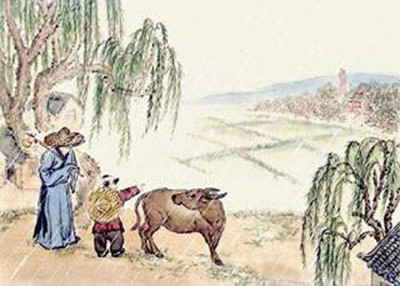(单词翻译:单击)

一听清明节就想到扫墓,很严肃吧,其实完全相反,清明节是一年当中除了春节最热闹的节气,踏青、荡秋千、蹴鞠、植树等等。你今年的清明节小长假要怎么过呢?
Ching Ming Festival, the custom is to enrich interesting, in addition to pay attention to ban fire, grave, as well as hikers, swinging, Cuju, playing polo, Liu inserted a series of custom sports. According to legend, this is because the Ching Ming Festival to Cold Food Observance ban fire, in order to prevent the Cold Food Observance buffet beverages, so we come to participate in some sports, in order to exercise. Therefore, this festival in both Jisaoxinfen Health Do not die from the acid tears of sorrow, another outing laughter of play, is a distinctive holiday.
清明节的习俗是丰富有趣的,除了讲究禁火、扫墓,还有踏青、荡秋千、蹴鞠、打马球、插柳等一系列风俗体育活动。相传这是因为清明节要寒食禁火,为了防止寒食冷餐伤身,所以大家来参加一些体育活动,以锻炼身体。因此,这个节日中既有祭扫新坟生别死离的悲酸泪,又有踏青游玩的欢笑声,是一个富有特色的节日。
Swing
荡秋千
This was the custom of the ancient Ching Ming Festival. Swing, which means grabbing Leather Strap and migration. Its history is very ancient, the earliest known future generations, the latter in order to avoid the taboo, replaced by swing. The ancient swing multi-purpose tree Lindera sticks to frame, then bolt on the ribbons made of. Later, the progressive development of the pedal for the use of two Shengsuo Jia swing. Swing can not only play better health, but also can develop courage, so far as the people, especially loved by children.
这是我国古代清明节习俗。秋千,意即揪着皮绳而迁移。它的历史很古老,最早叫千秋,后为了避忌讳,改为秋千。古时的秋千多用树桠枝为架,再栓上彩带做成。后来逐步发展为用两根绳索加上踏板的秋千。打秋千不仅可以增进健康,而且可以培养勇敢精神,至今为人们特别是儿童所喜爱。
Tzu-Chu
蹴鞠
Ju is a ball, the ball is made of leather with the leather ball plugged in with the hair. Cuju, is to use enough to play. This is the ancient Ching Ming Festival, when people love a game. Legend has it that the Yellow Emperor invented, the original purpose was to train warriors.
鞠是一种皮球,球皮用皮革做成,球内用毛塞紧。蹴鞠,就是用足去踢球。这是古代清明节时人们喜爱的一种游戏。相传是黄帝发明的,最初目的是用来训练武士。
Outing
踏青
Outing also known as spring tour. In ancient times called the Tan-chun, look for spring and so on. On Tomb Sweeping Day, spring, nature, scene of thriving vitality everywhere, it is an excellent picnic time. China's civil society long maintained the clear hikers habits.
又叫春游。古时叫探春、寻春等。三月清明,春回大地,自然界到处呈现一派生机勃勃的景象,正是郊游的大好时光。我国民间长期保持着清明踏青的习惯。
Planting
植树
Planting before Tomb Sweeping Festival, Chun-yang Zhao Lin, Chun-yu Fei Sa, planting seedlings with high survival rate, grow fast. Therefore, since ancient times, our country there is clear and bright tree-planting habits. It was Ching Ming Festival, also known as "Arbor Day." Custom has been circulating since planting. In 1979, the Standing Committee that each year's Arbor Day March 12 for China. This is to mobilize people of all nationalities active in greening the motherland of great significance.
清明前后,春阳照临,春雨飞洒,种植树苗成活率高,成长快。因此,自古以来,我国就有清明植树的习惯。有人还把清明节叫作“植树节”。植树风俗一直流传至今。1979年,人大常委会规定,每年三月十二日为我国植树节。这对动员全国各族人民积极开展绿化祖国活动,有着十分重要的意义。
Kite-flying
放风筝
Kite-flying is also the Tomb Sweeping Festival is one of the favorite activities. Every Tomb Sweeping Festival, people not only put during the day, night is also put. Night in the kite or the wind under a steady pull strings of colored lines hung a small lantern, like a flashing star, known as the "Magic Lamp." In the past, some people have put the blue sky kite after they cut the go-between, brushing breeze sent them away, they said that this will Chubing misfortunes, to bring good luck for himself. 也是清明时节人们所喜爱的活动。每逢清明时节,人们不仅白天放,夜间也放。夜里在风筝下或风稳拉线上挂上一串串彩色的小灯笼,象闪烁的明星,被称为“神灯”。过去,有的人把风筝放上蓝天后,便剪断牵线,任凭清风把它们送往天涯海角,据说这样能除病消灾,给自己带来好运。


